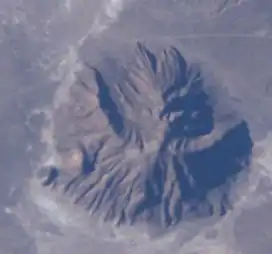Pumiri
Pumiri is a 4,862-metre-high (15,951 ft) volcano in the Andes that rises 1,062 metres (3,484 ft) above the surrounding terrain.[1] The volcano is located in the Oruro Department, Sabaya Province, northwest of the Salar de Coipasa.[2]
| Pumiri | |
|---|---|
 Pumiri as seen from space | |
| Highest point | |
| Elevation | 4,862 m (15,951 ft) |
| Coordinates | 19°00′00″S 68°26′00″W[1] |
| Geography | |
 Pumiri Location in Bolivia | |
| Location | Bolivia, Oruro Department, Sabaya Province |
| Parent range | Andes |
The volcano is formed from two volcanic cones. The younger of which may be of Holocene age and is constructed in the middle of a caldera marked by a semilunar shape.[3]: 141 Thanks to heavy erosion, lavas and eruption products are mostly found in peripheral parts of the edifice, while in the central area a deep-grounded crystalline core is exposed.[4]: 150 A breach 3.5 kilometres (2.2 mi) wide and 5.5 kilometres (3.4 mi) long with an azimuth of 139° lies in the volcano, whose summit has a maximum slope of 25°.[1] The volcano forms a lineament with Saxani and Isluga.[5]
The creeks named Qhamiña (Camiña) and on the western side Waywasi (Guayhuase) originate on the volcano.[6]: 101 Sulfur deposits on the volcano were exploited by indigenous people.[7]: 63
References
- Francis, P. W.; Wells, G. L. (1988). "Landsat Thematic Mapper observations of debris avalanche deposits in the Central Andes". Bulletin of Volcanology. 50 (4): 261. Bibcode:1988BVol...50..258F. doi:10.1007/BF01047488. ISSN 0258-8900. S2CID 128824938.
- Jiménez, J.A.; Cano, M.J. (2008). "Taxonomic assessment of Didymodon pruinosus (Mitt.) R.H. Zander (Bryophyta, Pottiaceae) a poorly known South American taxon". Nova Hedwigia. 87 (1): 146. doi:10.1127/0029-5035/2008/0087-0145. ISSN 0029-5035.
- Geologisches Jahrbuch: Allgemeine und regionale Geologie Bundesrepublik Deutschland und Nachbargebiete, Tektonik, Stratigraphie, Paläontologie (in German). E. Schweizerbart'sche Verlagsbuchhandlung in Kommission. 1976.
- Archives de minéralogie (in French). 1934.
- Avila-Salinas, Waldo (1991). "Petrologic and tectonic evolution of the Cenozoic volcanism in the Bolivian western Andes". Andean Magmatism and Its Tectonic Setting. Geological Society of America Special Papers. Vol. 265. p. 248. doi:10.1130/SPE265-p245. ISBN 0-8137-2265-9. ISSN 0072-1077.
- Guillermo Eduardo Billinghurst (1893). La irrigación en Tarapacá (in Spanish). Imprenta y Librería Ercilla.
- Guillermo Eduardo Billinghurst (1886). Estudio sobre la geografía de Tarapacá: (páginas de un libro) (in Spanish). Imprenta de "El Progreso".